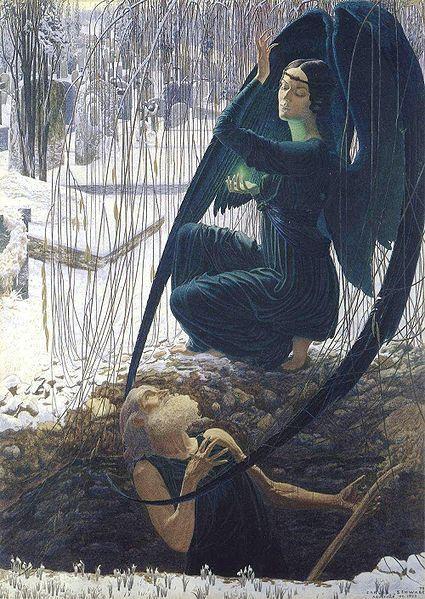Although I’m not Roman Catholic, I often thought about joining a monastery as a teen and twenty-something. The idea of spending all my time devoted to contemplating the ultimate reality still has a strong appeal. I know quite a few rationalists who have no time for spirituality, but it seems to me that we all need it for facing death. Most people, I know, avoid the topic if at all possible. Contemplatives, on the other hand, spend quite a bit of time preparing for it. Since it’s inevitable that makes sense. I often wonder why people consider the most common thing in human experience with such trepidation. If it’s a source of anxiety, shouldn’t it be confronted? That’s not to say we need to look forward to it, but it does mean we shouldn’t run from it either.
 Carlos Schwabe, Death of the Undertaker; Wikimedia Commons
Carlos Schwabe, Death of the Undertaker; Wikimedia Commons
The combination of Christianity and rationalism, it seems to me, lead to this terror. Christianity because it views death as an enemy, and rationalism because it has no comfort to offer. I’ve been reading about how pre-Christian cultures thought of death. They didn’t display the fear that Paul seems to have introduced into the equation. Since American culture is so heavily influenced by the Bible (as was European culture before it), we have adopted the scriptural view that death is a problem. The Hebrew Bible, in which there was no real afterlife, was less concerned with making sure you avoided Hell—they had no Hell to avoid. The anxiety seems to have been introduced by, ironically, the concept of resurrection.
I’ve noted on pieces I’ve written for other websites that resurrection is among the favorite themes for horror films. One of the reasons is precisely this discomfort in taking death at face value. Our religions keep us aware of the spiritual side of our nature. They have developed around the world in different forms and all of them address death in some way. Most without a profound sense of anxiety. There is some irony in cultures that adopt resurrection as a theological tenet are among those that try to avoid death most assiduously. It plays into those cultures’ views on abortion and capital punishment. As well as their performance of social justice. While Paul asked death where its sting was, and seems legitimately not to have feared it, in the centuries following his position seems to have eroded. There seems to be plenty to contemplate here, if only secular society had monasteries.
